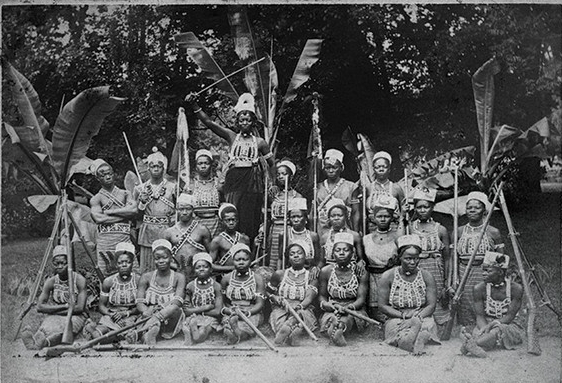The rise and expansion of Dahomey since the mid-seventeenth century coheres with the rise of transatlantic slaving and the extensive availability of firearms. On several occasions, however, the Yoruba-controlled Oyo state would reinforce its hegemony over Dahomey’s foreign affairs throughout the eighteenth century. Between 1400 and 1800, the introduction of firearms into western Africa—whether Ottoman, French, or British-supplied guns—changed the entire complexion of how and why wars were fought, the feasibility of captive peoples, and the nature and carnage of conquest based upon annihilation rather than honor or ransom. By the first half of the eighteenth century, Asante hegemony extended into areas belonging to present-day Ivory Coast, Burkina Faso, and Togo, while tensions between Asante and Dahomey was restricted by a shared mountainous border. Dahomey was also preoccupied with military campaigns against smaller coastal states—in order to monopolize trade relations with Europeans—adding to the years of expansionist wars. In the first half of the eighteenth century, Ouidah (“Whydah”) became Dahomey’s port of choice to interface with Europeans. States such as Dahomey rivaled and fought against each other, secured firearms, protected themselves during their expansion, and bargained independently with Europeans in their fortified coastal bases. The major port of Ouidah, re-conquered in 1728 by Dahomey, served this intermediary purpose, but also brought with it the consequences of intra-African warfare, depopulation, and a feeding of transatlantic slaving—especially, after its legal abolition in 1807—to Brazil and elsewhere.
Whydah
(The soil is uncultivated) having been for these last twelve years a continual Seat of War. Heretofore Report assures us, that while the Whydahs [possessed] it, the Land produced as great if not greater Quantities of Corn etc. than any of the Guinea Countries along the Coast. It is almost from this Time too that the Trade has gradually [decreased], at least so soon after as the King of Dahome [Dahomey] began to find the Value of the Commodities, which he at first in the Gayety [gaiety = celebration] of his Conquests so luxuriantly Bartered for anything that bore the Stamp of Europe: insomuch that it is now Confined only to the Slave Trade, which declines too in proportion with the power of the King of [Dahomey], which is at present at so low an Ebb, that it has been lately employed and even often without Success, upon his own, or his Tributary Subjects. These disappointments have made him so fond of Gold, that he will not only not part with any himself, but forbids on Pain of Death, and [sic] of his Subjects to Trade with it for any Commodity whatsoever. However as the Slave Trade is [still] left open to the Natives, there is always something going on, by its being almost the only part of the Coast, which produces such Slaves as suit the Delicacy of the [Portuguese], who undoubtedly bring the greatest part of the Gold that is to be met with here…. As it [the Country about this fort] is at present in the hands of the King of [Dahomey], it will be the last part of his Kingdom he will part with, as he well knows the advantage of keeping up the Fort upon a Trading Footing: And yet the Chief is subjected to many disagreeable Compliances to his Commands, which would be below the Dignity of a White Man upon this Coast, did not Necessity oblige him to it. The Distance of his Residence at Ardah [Arda] being not above 27 Miles [bearing northeast by north] the king summons the Chief upon most Trifeling Occasions, sometimes more only to attend the Superstitious Ceremonies of his Religion.
Source: “A Description of the Castle’s Forts and Settlements Belonging to the Royal African Company of England on the Gold Coast and Whydah,” U.K. National Archives at Kew, Treasury 70/1470 [ca. 1737].

